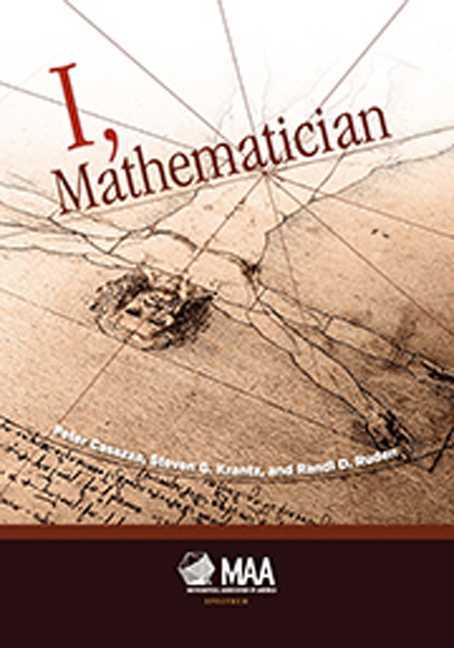Preface
Summary
What This Book is About
The mathematical life is a rewarding, satisfying, and fulfilling one. But it has its trials. As a clinical psychologist has observed, mathematicians and oboe players have a lot in common: they both do something very difficult that other people do not appreciate. We have all had our fill of the shopworn lament, frequently encountered in social situations, to the effect that “I was never any good at mathematics.” Or, perhaps worse, “I was very good at mathematics until we got to the stuff with the letters—like algebra.”
Fortunately, there is evidence that the tiresome observations in the last paragraph are not really indicative of the general public feeling about mathematics. Just as an instance, the popularity of the movie A Beautiful Mind and the television show Numb3rs is an indication of some public fascination with mathematics. The public responded strongly and enthusiastically to Andrew Wiles's solution of Fermat's last problem. There was genuine interest and curiosity about Grisha Perelman's proof of the Poincaré conjecture. Most anyone would like to know more about the shape of the universe. People respect mathematics; they are just intimidated by it.
At the MAA Summer MathFest in 2007, Peter Casazza, Steven Krantz, and Frank Morgan were invited to organize a special session entitled The Psychology of the Mathematician. The avowed purpose of that event was to discuss what mathematicians think of themselves and what others think of us. This was a well-attended session, with lively and heartfelt discussions. The speakers went into some detail, and were often quite emotional. As a consequence, MAA Editor Don Albers invited us to produce a volume inspired by our special session. Frank Morgan withdrew from that particular project, and Randi Diane Ruden joined it. So we now have a volume edited by three scholars with diverse interests.
We invited two types of articles for this volume. The plenary articles, generally by well-known mathematical figures, are putatively about the theme of the session: “What Do People Think About Mathematicians?” The secondary articles, rather more brief, are about “Why I Became a Mathematician.” Taken together, the two collections of articles paint a varied and multifaceted panorama of ways to think about our profession, our subject, and those who people it.
- Type
- Chapter
- Information
- I, Mathematician , pp. xi - xivPublisher: Mathematical Association of AmericaPrint publication year: 2015

